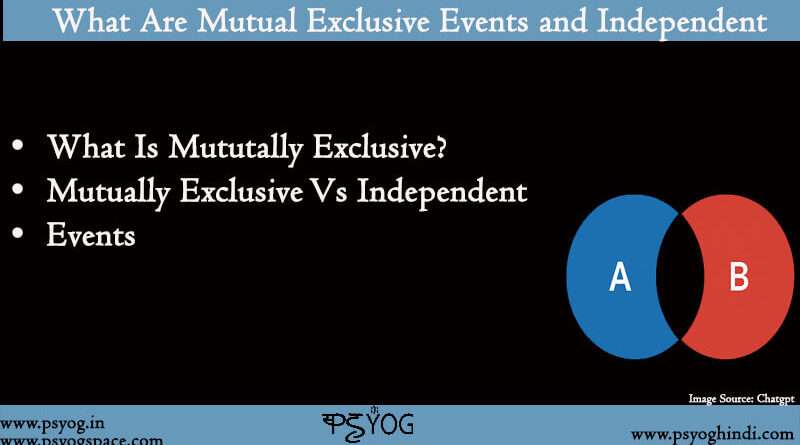Mutually Exclusive: Meaning, Definition, Events and Vs Independent
We are sure that you’ve probably been in a situation where two things just couldn’t happen at once. Like getting invited to two weddings on the same day, in different cities. You gotta pick one. That’s mutually exclusive in action, whether or not you knew the term for it.
Now, if you’re here wondering what this actually means—not just in casual life but in math, logic, and probability—you’re in the right place. This article walks through its meaning, gives you the proper definition, shows real-world events, and explains how it compares vs independent scenarios. No fluff. No robot-speak. Just straight talk.
Mutually Exclusive Meaning
Let’s make it simple. Its meaning is: if one thing happens, the other absolutely cannot.
That’s it. It’s that clear.
You flip a coin. It lands on heads or tails—never both. That’s mutually exclusive. When something cancels something else out just by happening, we say those two things are mutually exclusive.
It shows up everywhere. Think of when you’re picking dinner—ordering pizza or sushi. If you’re getting just one, choosing one rules out the other. It’s kind of funny how we bump into its meaning in daily choices and never give it a name. But here it is—named, defined, and hiding in plain sight. (Read: The trending La Bubu)
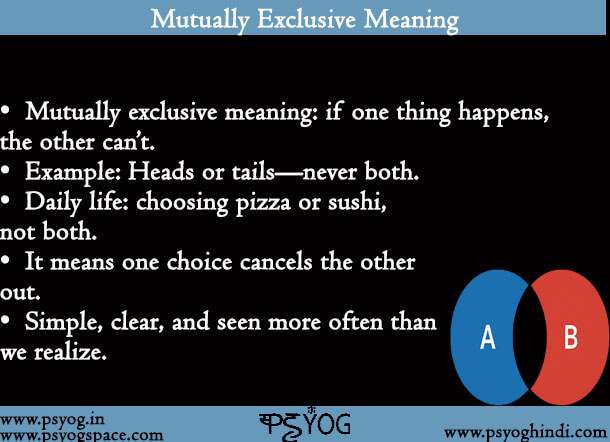
Mutually Exclusive Definition
Now, if we want to sound fancy—or if you’re trying to remember this for school—the mutually exclusive definition in probability is this: two events are mutually exclusive if they can’t both happen at the same time.
The mathematical version is even shorter:
P(A and B) = 0
Translation? The probability that A and B happen together is zero.
A good example: Drawing a single card from a deck. If you pull the Ace of Hearts, it’s impossible to have also pulled the Jack of Spades in the same draw. The mutually exclusive definition doesn’t allow overlap. One thing happens. The other doesn’t. That’s the deal.
People sometimes get confused and think “rare” or “unlikely” means mutually exclusive. But no. Mutually exclusive means impossible for both to happen together—not just improbable. Important difference.
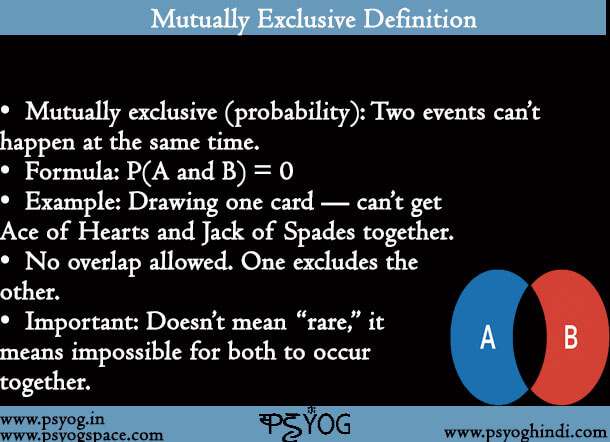
Mutually Exclusive Events
So let’s dig into some examples of mutually exclusive events. These are the kind of things you probably know, even if you never said the words out loud.
- Coin toss: You can’t land on both heads and tails in one flip.
- Rolling a die: If you roll a 6, you definitely didn’t roll a 2.
- Voting: In most elections, you vote for one person. Not both.
- Single-choice test questions: Choose one answer, and you’re locked out of the others.
- Crossing paths: Two trains on one-track going opposite directions? One has to wait. That’s life being mutually exclusive.
Why do mutually exclusive events matter? Because they simplify things. They force us to think in absolutes. When you recognize mutually exclusive outcomes, you stop wasting time on impossible combinations. (Read: Wisdom does not come with time)
Weirdly, we try to fight this in life sometimes—trying to “have it all.” But when you know some things just don’t mix, decisions get clearer.
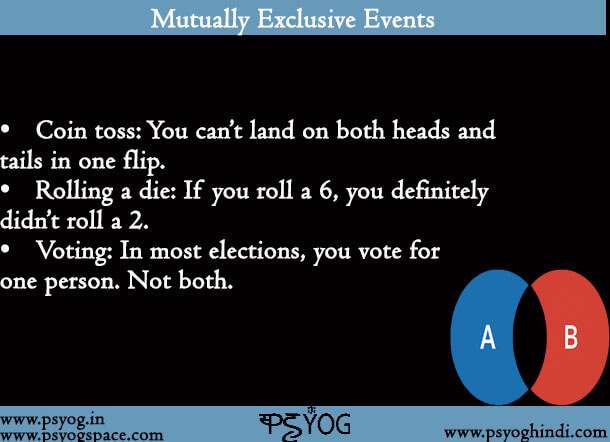
Mutually Exclusive vs Independent
Okay. This is the part that trips people up: mutually exclusive vs independent. These two concepts are often confused, but they’re actually opposites in many ways.
Let’s start with independent events. These are events where one happening has no effect on the other. Like flipping a coin and rolling a die. You get tails and a 5? Cool. They don’t affect each other.
Now compare that to mutually exclusive events. These are totally connected—so connected that if one happens, the other is blocked from happening entirely.
So what’s the real difference in mutually exclusive vs independent?
Mutually exclusive: If A happens, B can’t.
Independent: A happens, and B doesn’t care.
Here’s a funny example. If you’re eating an apple, you’re not eating a banana at the same time (unless you’re doing something very weird). Those are mutually exclusive snacks. But watching TV while texting? One doesn’t cancel out the other. They’re independent actions.
In the world of statistics and logic, getting these mixed up can wreck your results. Seriously. So remembering the core of mutually exclusive vs independent is super helpful—not just in exams, but in planning, betting, and everyday reasoning.
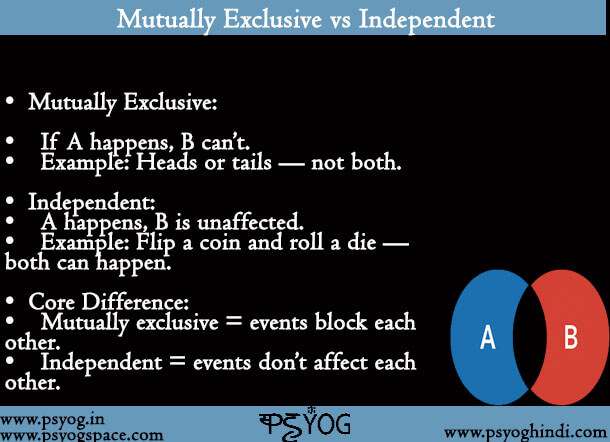
Conclusion
So there you go. You’ve met mutually exclusive, learned the meaning, understood the definition, seen it in real events, and clarified how it differs vs independent cases. (Read: What is YOLO?)
Let’s recap real quick:
Mutually exclusive means one thing happening makes the other impossible.
The meaning shows up all the time in daily life, like it or not.
The definition gives it form, especially in probability.
Examples of events make it easy to visualize.
And vs independent? That’s where things get clearer, fast.
Once you start spotting mutually exclusive situations, it becomes second nature. And honestly? It’s kind of satisfying. Like cracking a little logic puzzle in everyday life.
So next time you’re stuck between two things that clearly can’t coexist—smile. You’re dealing with something mutually exclusive. And now you know exactly what to call it.
FAQs
What does mutually exclusive mean?
As the name suggests, mutually exclusive refers to those events that cannot happen simultaneously, they cannot happen together. For example, let us say that you toss a coin, obviously you cannot get heads and tails at the same time, right? Such events are said to be mutually exclusive because they cannot happen together.
What is the difference between independence and mutually exclusive?
Mutually exclusive refers to those events that cannot happen simultaneously. For example, if you toss a coin, you cannot get heads and tails at the same time. On the contrary, independence means that both events can happen simultaneously. For example, you watch a movie and use your phone at the same time.

